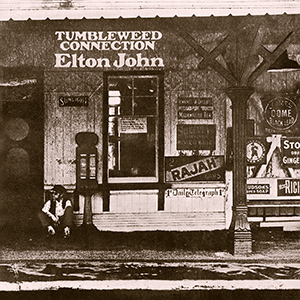
Tumbleweed Connection is the third studio album by English singer-songwriter Elton John. It was recorded at Trident Studios, London, in March 1970, and released in October 1970 in the UK and January 1971 in the US. It is a concept album based on country and western and Americana themes. All songs are written by John and Bernie Taupin, with the exception of "Love Song" by Lesley Duncan.
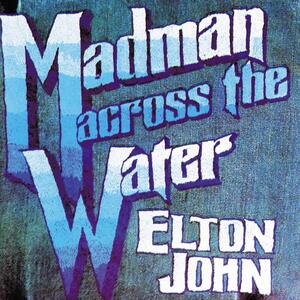
Madman Across the Water is the fourth studio album by English musician Elton John, released on 5 November 1971 by DJM and Uni Records. The album was his third album to be released in 1971, at which point John had been rising to prominence as a popular music artist. John's first progressive rock album, Madman Across the Water contains nine tracks, each composed and performed by John and with lyrics written by songwriting partner Bernie Taupin. Yes keyboardist Rick Wakeman plays Hammond organ on two songs.

"Tiny Dancer" is a song written by English musician and composer Elton John and lyricist Bernie Taupin, and performed by John. It was originally released on John's 1971 album Madman Across the Water as its opening track, and was later produced and released as a single in 1972.
"Candle in the Wind" is a threnody style ballad written by English musician Elton John and songwriter Bernie Taupin, and performed by John. It was originally written in 1973, in honour of Marilyn Monroe, who had died 11 years earlier.

Breaking Hearts is the eighteenth studio album by English musician Elton John, released in 1984. It features the quartet of John, Davey Johnstone, Dee Murray and Nigel Olsson. There were four top-40 singles from the album: "Sad Songs ", "Who Wears These Shoes", "In Neon", and the UK No. 5 hit "Passengers".

"Crocodile Rock" is a song written by Elton John and Bernie Taupin, and recorded in summer 1972 at the Château d'Hérouville studio in France, where John and his team had previously recorded the Honky Château album. It was released on 27 October 1972 in the UK and 20 November 1972 in the U.S., as a pre-release single from his forthcoming 1973 album Don't Shoot Me I'm Only the Piano Player, and became his first U.S. number-one single, reaching the top spot on 3 February 1973, and staying there for three consecutive weeks. In the U.S., it was certified Gold on 5 February 1973 and Platinum on 13 September 1995 by the Recording Industry Association of America (RIAA).

"Levon" is a song written by English musician Elton John and songwriter Bernie Taupin, and performed by John. It was recorded on 27 February 1971, and was released on John's 1971 album, Madman Across the Water. Backing vocals are provided by Tony Burrows. Paul Buckmaster wrote the orchestral arrangements and conducted the orchestra.

"Someone Saved My Life Tonight" is a song with music by British musician Elton John and lyrics by Bernie Taupin, from John's 1975 album Captain Fantastic and the Brown Dirt Cowboy. It was released as a single on 20 June 1975, the only single released from the album. Like the rest of the album, the song is autobiographical, and addresses an attempted suicide by John.

"Saturday Night's Alright for Fighting" (sometimes written "Saturday Night's Alright (For Fighting)") is a song originally recorded by English musician Elton John. John composed it with his long-time songwriting partner Bernie Taupin. It was released on John's best-selling album Goodbye Yellow Brick Road (1973) and as the first single. It has been covered by many artists and featured on motion picture, video game, and television soundtracks.

"Nikita" is a song by English musician Elton John from his 19th studio album, Ice on Fire (1985). It was released as the album's lead single on 4 October 1985, charting at number three on the UK Singles Chart, peaking at number seven in the United States, and reaching the top 10 worldwide, topping the charts of eight countries. The song features George Michael on backing vocals and Nik Kershaw on guitar.

"I Guess That's Why They Call It the Blues" is a song by English musician Elton John, with music by John and Davey Johnstone and lyrics by Bernie Taupin, released as the first single from John's 17th studio album Too Low for Zero. It was the first single since 1975's "Someone Saved My Life Tonight" to feature the classic lineup of the Elton John Band.
"Come Down in Time" is the second track on Elton John's third album, Tumbleweed Connection, released in 1970. The lyrics were written by Bernie Taupin, Elton's long time writing partner. The song was originally recorded for John's second album, Elton John.
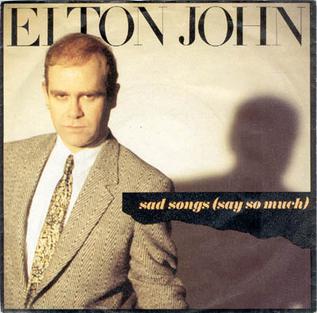
"Sad Songs (Say So Much)" is the closing track on English musician Elton John's 18th studio album Breaking Hearts, written by John and Bernie Taupin, released in 1984 as the lead single of the album. It reached No. 7 on the UK chart and No. 5 on the US Billboard Hot 100 chart. The song reached the Top 10 of many countries except in Germany and Italy where it reached the Top 20. The single version of this song appeared on the 1990 box set To Be Continued... and various versions of the 2007 compilation Rocket Man: The Definitive Hits.

"Mona Lisas and Mad Hatters (Part Two)" is a song by English musician Elton John and songwriter Bernie Taupin from the album Reg Strikes Back. It was released as a 12" single in 1988 only in the United States. The single did not include the basic version from Reg Strikes Back album.
"Crazy Water" is a song by English musician Elton John with lyrics written by Bernie Taupin. It is the seventh track on his 1976 album, Blue Moves. It was released as a single in the UK in February 1977. The single reached No. 27 in the UK singles charts.
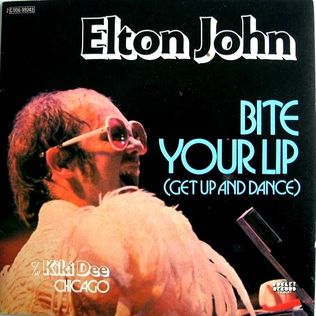
"Bite Your Lip " is a song co-written by English musician Elton John with lyrics by Bernie Taupin. It is the closing track of his 1976 album, Blue Moves. It came out as a single two months after the release of the album. The US b-side was another album track, "Chameleon", which was also featured on the "Crazy Water" single that only came out in the UK, only four days later, but the UK release of 'Bite Your Lip' was released as a double-A side single, which was backed with 'Chicago' by Kiki Dee, making the release a joint chart effort. The single peaked at No. 28 in both the U.S. and the UK. 500 copies were sent to radio DJ's on a special 12" edition, by The Rocket Record Company.

"Ego" is a 1978 song performed by English musician Elton John, written by John and Bernie Taupin. It was released in early 1978 as a standalone single, and did not appear on the album released in the same year, A Single Man. John played this song live from 1978 up until 1980. The single reached #34 in both the UK and the US.

Passengers is a 1984 song by English musician Elton John that appears on his 1984 album Breaking Hearts, released as the second single of the album. The song reached number five on the UK chart, and reached the top ten in Australia, but was not released as a single in the US.
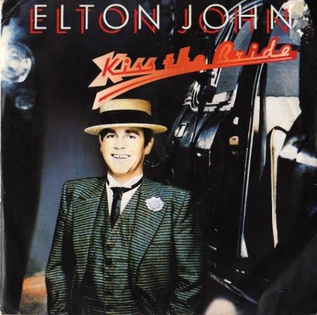
"Kiss the Bride" is a song by English musician Elton John, from his 17th studio album, Too Low for Zero, written by John and Bernie Taupin. Released as the album's third single, the upbeat song was a top 40 hit in many countries. It reached No. 20 on the UK Singles Chart, No. 25 on the US Billboard Hot 100 chart, No. 25 in Australia, No. 37 in Canada, No. 17 in Ireland, and No. 32 in New Zealand. In Germany, the song peaked at No. 58.
"We All Fall in Love Sometimes" is the ninth track on Elton John's album Captain Fantastic and the Brown Dirt Cowboy, written by John (music) and Bernie Taupin (lyrics), and released in 1975.













